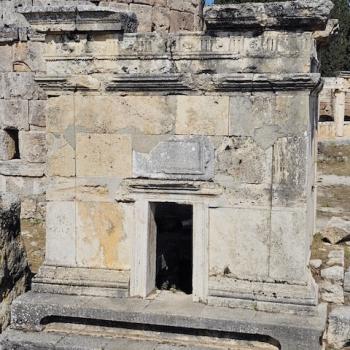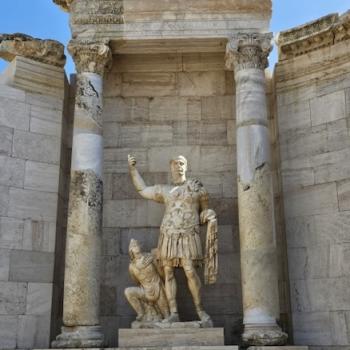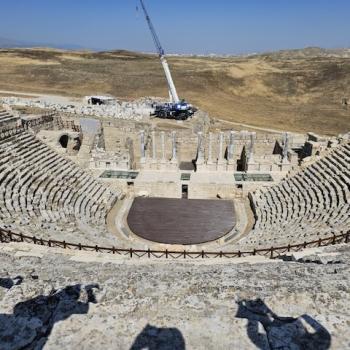The article by Andreas Dettwiler (translated by Eric Gilchrest and Nicholas Zola, the former of which is one of my own former students) has much the same orientation as the article by Sterling, reviewed in the previous post in this particular series. That is, it involves a comparison of the supposedly deutero-Pauline Colossians and Ephesians to the portrait of Paul in Acts. Like so many who take this view of the pseudonymous character of those Pauline letters, the author talks about a Pauline school, something for which we have no historical evidence or basis whatsoever. Dettwiler however wants to emphasis that authority stressed in these documents.
Thus, for example Dettwiler points out that in Colossians and Ephesians Paul is presented as an uncontested authority figure, in contrast to the earlier Paulines. This contrast forgets that: 1) Colossians is written to a congregation Paul did not found and had not gotten embroiled in controversy with, and 2) Ephesians is a circular document not an ad hoc particularistic one. This does not allow the confident conclusion “Therefore, the Paul of Colossians, and even more noticeably the Paul of Ephesians, seems to have been a figure detached from any historical contigency or individuality.” (p. 249).
With those sorts of presuppositions, Dettwiler then is somewhat surprised that the image of Paul conveyed in these documents doesn’t amount to guilding the lily, or turning Paul into a hero. He is also somewhat surprised that in the case of Ephesians the writer “does not seem to have made any effort to create a strong and convincing ‘pseudepigraphical situation’.” And then he endorses the conclusion that “we are dealing here with a pseudepigraphy that lacks real pseudepigraphical elements.” (p. 251), in contrast to some efforts in that direction in Colossians. Of course these puzzles disappear if these are Pauline documents, and the later one is a circular letter. Sometimes scholarly presuppositions create more problems than they solve. Of course all of this is brought into question by Ehrman’s now very detailed demonstration that there was no literary convention in antiquity of pseudepigraphy that made it an ethically unobjectionable practice.
I agree with Dettwiler however that Luke does not present Paul as a largely polemical figure. It is untrue to say that Paul is not presented as a controversial figure, at least in the context of Jerusalem. To the contrary, Paul is constantly embroiled in controversy in Acts when he goes to Jerusalem, and finally it leads to his incarceration. What is interesting about this is that Luke is fair enough to show that the controversy was with both non-Christian Jews, and Christian ones (see Acts 15). Note as well, that not even the Christian ones come to his defense when he is under house arrest in Caesarea Maritima. Not even Luke presents us with an uncontroversial, non-polemical Paul. Dettwiler explains the lack of calling Paul an apostle in Acts as a result of Luke being in a community where the term was limited to the 12. This hardly explains what we find in Acts 14. Is Paul then presented as a figure of uncontested authority in Acts and Ephesians? No, in the former case, and the matter is not an issue in Ephesians.
Dettwiler then turns to the dialogical nature of ancient friendly letters, as outlined by Cicero and Seneca. Here he is on more solid footing. He quote Stan Stowers approvingly when he says that letters convey a fictive presence of the author to the recipient when the author is absent (earlier scholars called this the apostolic parousia–see p.255). Dettwiler however makes a good point when he stresses that the mention of Paul being in chains underscores the forced absence of the apostle, and gives more pathos to these Pauline letters especially underlining his suffering on their behalf. I also agree with Dettwiler that Luke, while alluding to the demise of the person of Paul, stresses the ongoing endurance of the Word, boldly proclaimed in the capital city– Rome (p. 256). But then Luke is writing salvation not a biography of Paul.
Dettwiler goes on to emphasis the ‘musterion’ dimension of both Colossians and Ephesians, with Paul being the special emissary who unveils the mystery of God’s inclusion of the Gentiles into God’s people without their becoming practicing Jews. Dettwiler admits that this seems to be stressing that Paul has a very high authority, indeed a unique one to unveil this form of the Gospel and so reach the Gentiles for Christ. It is going too far however to speak of a quasi-soteriological status for Paul (p. 258). Yet Paul is the paradigmatic presenter of the Good News for the Gentiles, and both Colossians and Ephesians allude to this, but so does Acts in a different narratival way.
Dettwiler is however on to something in stressing that in Acts it is Paul the founder of communities that is stressed whereas in the letters it is Paul the developer and nurturer of communities, hence Luke does not mention the letters. Put another way Luke is focusing on evangelism, Paul in his letters on discipleship. (see p. 260). This should have led to the conclusion that it’s not a big deal that Luke chooses not to mention the letters. It’s outside the scope of what he is trying to unveil in Acts— the spread of the Word across the Mediterranean to more and more people groups. Dettwiler concludes his essay (pp. 262-63) by rightly stressing that more reflection should be given to the relationship of Paul as paradigmatic presenter of the Gospel, and Paul as a unique and distinctive proclaimer of the Good News to the Gentiles. Here I would just suggest that as 1 Cor. 3 says, there is a difference between the historical role the man played as church planter, which was often unique, and the message or Word that he planted, which was shared by Apollos and others.














